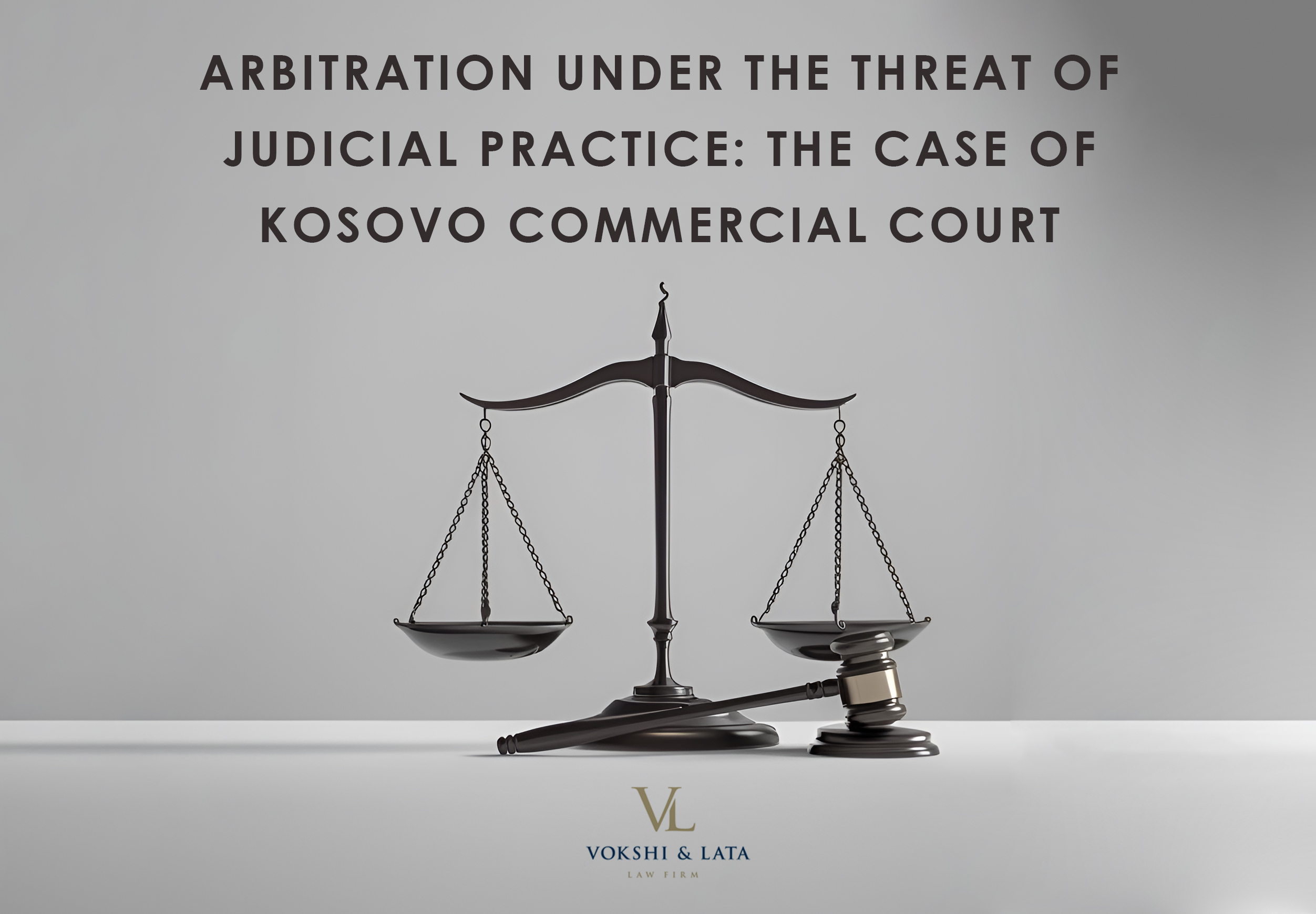ARBITRATION UNDER THE THREAT OF JUDICIAL PRACTICE: THE CASE OF THE KOSOVO COMMERCIAL COURT

May 15, 2025
Author: Florin Lata
Kosovo’s legal framework recognizes arbitration as a legitimate and binding mechanism for the resolution of commercial disputes. Two institutional arbitral tribunals operate domestically: the Arbitration Tribunal of the Kosovo Chamber of Commerce and that of the American Chamber of Commerce in Kosovo (AmCham). Yet, emerging jurisprudence from the recently established Commercial Court poses a direct threat to the enforceability of arbitral agreements and awards, particularly in lease-related matters.
In a troubling series of decisions, the Commercial Court has annulled final and binding arbitral awards issued by the Tribunal of the Kosovo Chamber of Commerce. The Court’s reasoning hinges on Article 41 of the Law on Contested Procedure (LPK), which addresses territorial jurisdiction in disputes involving immovable property. According to the Court, this provision overrides the parties’ contractual agreement to arbitrate, rendering lease-related disputes non-arbitrable. Such reasoning reflects a fundamental misunderstanding of the distinction between court jurisdiction and arbitrability.
Misapplying article 41 of the LPK: jurisdictional rules versus arbitrability doctrine
Article 41 of the LPK states:
“For disputes concerning ownership or other real rights over immovable property, or disputes arising from lease agreements of immovable property, the court in whose territory the immovable property is located shall have exclusive jurisdiction.”
While this article defines territorial jurisdiction among state courts, it has no bearing on the validity of arbitration agreements. Once parties have opted to resolve disputes through arbitration, the procedural rules governing court jurisdiction, including Article 41, no longer apply. This principle is consistently upheld in comparative practice and international arbitration doctrine.
Under the Law on Arbitration (Law No. 02/L-75), Article 4 provides:
“Any dispute arising out of a contractual or non-contractual relationship that is subject to the parties’ disposition under the law may be resolved through arbitration.”
Meanwhile, Article 36(2)(iv) permits annulment of an arbitral award only where the matter is not arbitrable under Kosovo law or where the award violates public policy. Nowhere does the law exclude lease agreements from the scope of arbitrability—particularly where the dispute concerns contractual payment obligations rather than real property rights.
Strategic contradiction: when the drafter challenges its own clause
In each of the analyzed cases, it was the lessor—often a commercial center or shopping mall—who had drafted and imposed an arbitration clause within its standard lease agreement. Yet, once the arbitral award was rendered against its interest, the same party sought to annul the award before the Commercial Court, alleging lack of jurisdiction. This approach not only undermines the principle of pacta sunt servanda but also raises serious concerns about the opportunistic use of litigation to evade adverse arbitral outcomes.
Case examples from the Commercial Court
In case K.DH.SHK.II.nr.1118/2024, the Tribunal of the Kosovo Chamber of Commerce rendered an award obliging the tenant to pay outstanding rent under the lease agreement. The arbitration clause had been clearly incorporated into the contract. However, the Commercial Court annulled the award, reasoning that lease disputes involving immovable property fall under the exclusive competence of state courts pursuant to Article 41 of the LPK. The Court failed to engage with the substantive nature of the dispute—which centered on payment obligations—and instead focused solely on the object of the lease, erroneously treating the existence of immovable property as a bar to arbitrability.
In case K.DH.SH.II.nr.1011/2024, the Court not only annulled the award but invalidated the arbitration clause itself, holding that it contravened mandatory procedural norms. In doing so, the Court effectively rendered all arbitration clauses in commercial lease agreements unenforceable, despite the absence of any such restriction under Kosovo’s arbitration legislation.
These rulings reflect a dangerous doctrinal conflation between the scope of judicial jurisdiction and the concept of arbitrability. Under established arbitral jurisprudence, courts have a limited supervisory role and should not interfere with the merits or existence of valid arbitration agreements—especially in commercial contexts where party autonomy is paramount.
Comparative insight: international arbitral practice on lease disputes
International jurisprudence confirms the arbitrability of lease-related disputes, especially in the commercial context:
In ICC Case No. 12683 (2004), the tribunal affirmed its jurisdiction in a dispute involving the unilateral termination of a commercial lease. The tribunal emphasized that the dispute pertained to contractual performance, not proprietary rights, and was thus arbitrable.
In SCC Case No. V (061/2017), a tribunal under the Stockholm Chamber of Commerce accepted jurisdiction in a dispute over unpaid rent and associated damages, without any challenge to its competence.
A case administered by the Swiss Chambers Arbitration Institution (2020) involved a claim arising from the alleged breach of a commercial lease. The tribunal upheld its jurisdiction, stressing that lease agreements of this nature fall squarely within the scope of arbitrable matters.
These examples reflect prevailing practice in leading arbitration jurisdictions-including France, Switzerland, Germany, Turkey, and Singapore-where commercial lease disputes are regularly and validly resolved through arbitration.
Conclusion: a call for doctrinal clarity and institutional coherence
The Kosovo Commercial Court’s emerging jurisprudence risks undermining the integrity of arbitration as a viable dispute resolution mechanism in Kosovo. The Court’s reasoning fails to differentiate between judicial jurisdiction and the parties’ autonomous agreement to arbitrate – a core principle of modern arbitration law.
We call upon Kosovo’s legal community, judiciary, academic institutions, and international development partners to engage in urgent dialogue on the matter. Kosovo has invested significantly in building a modern commercial legal framework. Ensuring consistency with international arbitration standards is essential to preserving legal certainty, investor confidence, and the broader credibility of the rule of law in commercial affairs.
